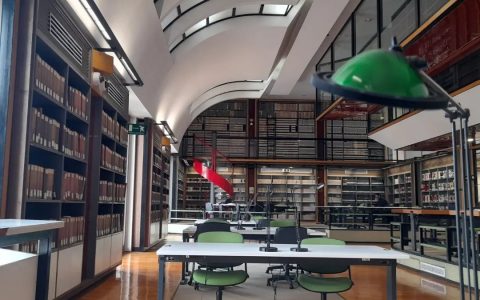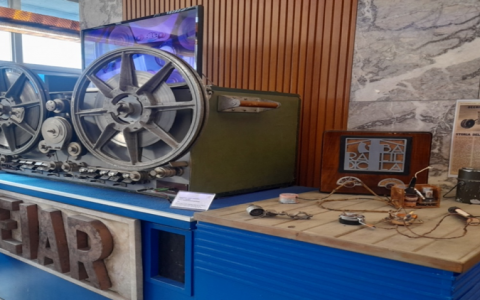Hello, Euroradio Wavers! This is Ester calling with her first post of the year!
Five months and a half since I embarked on this exciting project about BBC and RAI radio programmes for Italy in the post-war decades (1945-80s). After the festive season, my January started with a research trip to Rome to visit the Biblioteca RAI Teulada, the Archivio Centrale di Stato and a lot of bibliography reading.

Archivio Centrale di Stato in Rome, reading room.
Rome was the latest stop of a series of research trips that started in Turin in September and continued with London/Reading/Sunderland in October-November (see my first post). Regular archive trips for my project also include visits to the Mediateca RAI in Bologna, where I live, and where you can listen to the surviving audio recordings that have been digitized.
What was I looking for? After working on the BBC Italian Service during the Second World War for more than one decade, I was curious to know more about the ways in which both BBC and RAI radio contributed to exporting British popular culture in Italy after the end of the conflict. But I was also eager to find out about how the relationships between the two radio stations developed after the end of the war.
Radio Londra’s programming during the war is mainly remembered as the voice of anti-fascism, despite the BBC being the radio station of an enemy country. This reputation was obviously connected to its role as an alternative tool of information for the Italian population living under the yoke of Mussolini’s regime. What is less known is that before the Italian entrance into the war, BBC and EIAR, as Italian radio was called until 1954, were constantly in touch to exchange advice about music, technical issues and programmes.

Museo della radio e della televisione RAI in Turin
The outbreak of the war interrupted their correspondence but the two broadcasters would continue to collaborate after 1945. This collaboration led, for example, to some programmes co-launched by the BBC and RAI in the 1950s. Their main scope was to tell the story of an average British or Italian man/woman and make Italians familiarize with the ways in which British society worked. In other words, as these programmes seem to suggest, British and Italians had many aspects of their lives in common, no matter how far they lived from each other. This strategy was very much in line with the wartime years but this time there was more space for interviews with local people and detailed descriptions of the typical day of a British-Italian teenage girl, housewife, factory worker, fisherman etc…
The BBC also began to interact more with its Italian listeners by inviting them to send requests about any curiosity relating to Britain and its inhabitants. All these letters resulted in programmes about cities, iconic places, or cultural aspects of British society.
That’s all for now folks!
It’s now time for me to pick up all the pieces I collected between Italy and the UK and put my jigsaw together.
As always, stay tuned and watch this space for other updates!
